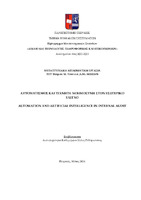| dc.contributor.advisor | Ρεθυμιωτάκη, Ελένη | |
| dc.contributor.author | Τσουνιάς, Μάριος | |
| dc.date.accessioned | 2024-11-01T06:46:17Z | |
| dc.date.available | 2024-11-01T06:46:17Z | |
| dc.date.issued | 2024-05 | |
| dc.identifier.uri | https://dione.lib.unipi.gr/xmlui/handle/unipi/16924 | |
| dc.identifier.uri | http://dx.doi.org/10.26267/unipi_dione/4346 | |
| dc.description.abstract | Σκοπός της διπλωματικής εργασίας είναι η μελέτη της υιοθέτησης λύσεων αυτοματισμού και τεχνητής νοημοσύνης στα Συστήματα Εσωτερικού Ελέγχου επιχειρήσεων και δημόσιων οργανισμών. Η δομή του συστήματος αποτελείται από τρεις γραμμές άμυνας, τις επιχειρησιακές λειτουργίες για την παραγωγή των αγαθών και την παροχή υπηρεσιών, τη διαχείριση των κινδύνων και τον έλεγχο.
Η κείμενη νομοθεσία αναφορικά με την τεχνητή νοημοσύνη κατευθύνεται πρωτίστως από τον σχετικό Κανονισμό της Ευρωπαϊκής Ένωσης, και τους κανόνες που τίθενται από αυτήν αλλά και δημιουργούνται στις χώρες μέλη αναφορικά με την ανάπτυξη και τη διάθεση συστημάτων που την υιοθετούν. Παράλληλα, τα διεθνή ινστιτούτα ελεγκτών δημιουργούν πρότυπα που ενσωματώνονται σταδιακά στη νομολογία των χωρών μελών προκειμένου να διασφαλίσουν ενιαία και καθολική εφαρμογή.
Αυτοματοποιημένοι μηχανισμοί και συστήματα τεχνητής νοημοσύνης υιοθετούνται και εφαρμόζονται στο σύνολο των δραστηριοτήτων των επιχειρήσεων, καθιστώντας την υλοποίηση, τη χρήση και τον έλεγχο τους επιβεβλημένα. Για το σκοπό αυτό, προσδιορίζονται και επιμετρούνται οι κίνδυνοι από την εφαρμογή σχετικών μηχανισμών και αξιολογείται ο τρόπος ανάπτυξής και «εκπαίδευσής» τους βάσει της αξιοπιστίας των δεδομένων και της μεθοδολογίας που χρησιμοποιούνται.
Οι υλοποιήσεις περιλαμβάνουν λύσεις για την αυτοματοποίηση και τη βελτίωση της ποιότητας της γραμμής παραγωγής (π.χ. ρομποτικά συστήματα, αυτοματοποιημένα κέντρα εξυπηρέτησης πελατών), την παρακολούθηση των κινδύνων, τη συμμόρφωση με τις απαιτήσεις, αποτρεπτικούς μηχανισμούς σε συστήματα ηλεκτρονικής τραπεζικής, ανάλυσης συναλλαγών με τεχνικές data analytics, την αξιολόγηση πιστοληπτικής ικανότητας πελατών, την εγκριτική διαδικασία δανείων καθώς και πιο προηγμένων εφαρμογών που χρησιμοποιούν μηχανική μάθηση και επεξεργασία φυσικής γλώσσας.
Δεδομένου ότι η τεχνητή νοημοσύνη αποτελεί μία πραγματικότητα, έχοντας εισβάλει και βελτιώσει σημαντικά την καθημερινότητα της ανθρώπινης δραστηριότητας, η ηθική διάσταση σχετικά με την αυτοματοποιημένη λήψη αποφάσεων από ένα πληροφοριακό σύστημα που την υιοθετεί αποτελεί σημείο προβληματισμού. Παρότι, ενισχύει σημαντικά την εν λόγω διαδικασία και επεκτείνει τις δυνατότητες της ανθρώπινης νοημοσύνης, δεν πρέπει και δεν θα οδηγήσει στην αντικατάστασή της. | el |
| dc.format.extent | 111 | el |
| dc.language.iso | el | el |
| dc.publisher | Πανεπιστήμιο Πειραιώς | el |
| dc.rights | Αναφορά Δημιουργού-Μη Εμπορική Χρήση-Όχι Παράγωγα Έργα 3.0 Ελλάδα | * |
| dc.rights.uri | http://creativecommons.org/licenses/by-nc-nd/3.0/gr/ | * |
| dc.title | Αυτοματισμός και τεχνητή νοημοσύνη στον εσωτερικό έλεγχο | el |
| dc.title.alternative | Automation and artificial intelligence in internal audit | el |
| dc.type | Master Thesis | el |
| dc.contributor.department | Σχολή Τεχνολογιών Πληροφορικής και Επικοινωνιών. Τμήμα Ψηφιακών Συστημάτων | el |
| dc.description.abstractEN | The goal of the diplomatic essay was to study the applications deployed to automate the business processes, while also introducing Artificial Intelligence in the Internal Control Systems implemented by private organizations as well as those of the public sector. The Internal Control System comprises of three lines of defence, namely the business functions for the products and services provided to the customers, the risk management function, and the audit.
The applicable legislative framework with regards to the Artificial Intelligence mainly consists of the European Union Regulation (AI Act), including the rules and the standards which are gradually being created in the member states to establish a regulatory environment for the development and implementation of AI related appliances. Moreover, the international auditing institutes have created standards which may be also incorporated in the local laws of various countries to ensure homogenization and full applicability by all the stakeholders.
The automation of the business processes, including information systems adopting Artificial Intelligence, are applied almost in every aspect of an organization. Consequently, their adoption, their utilization and their evaluation by the audit function deems mandatory. Towards this purpose, the involved and inherent risks should be defined and assessed, including those related with their development and training with reliable and unbiased data and methodology.
The implementations provide for information systems addressed to all the three lines of defence, such as the automation of the production line and the quality management and improvement (e.g. robotics, automated customer care centres), the continuous risk monitoring, the continuous assessment of compliance with the regulatory and the legislative framework, intrusion detection and prevention mechanisms for the Web Banking systems, the analysis of transactions deploying data analytics techniques, the credit risk scoring and evaluation, the automated approval or rejection of a loan application, as well as more sophisticated solutions based on machine learning and natural language processing.
The Artificial Intelligence is a reality and has invaded the human daily activity, thus, affecting several aspects and improving everyday life. The morality beside the possibility for decision-making information systems, based on the analysis performed by the model and the training data provided by the end-user, raises questions that require persuasive responses. It is expected that the deployment of IT systems adopting Artificial Intelligence will enhance and improve the decision-making process and human intelligence without in any case replacing it. | el |
| dc.contributor.master | Δίκαιο και Τεχνολογίες Πληροφορικής και Επικοινωνιών (MSc in Law and Information and Communication Technologies) | el |
| dc.subject.keyword | Αυτοματοποίηση | el |
| dc.subject.keyword | Εσωτερικός έλεγχος | el |
| dc.subject.keyword | Σύστημα εσωτερικού ελέγχου | el |
| dc.subject.keyword | Τεχνητή νοημοσύνη | el |
| dc.subject.keyword | Προσωπικά δεδομένα | el |
| dc.subject.keyword | Έλεγχος | el |
| dc.date.defense | 2024-10-02 | |



